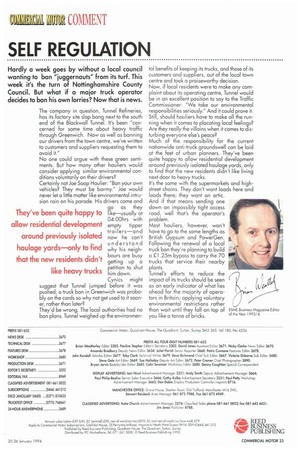SELF REGULATION
Page 25

If you've noticed an error in this article please click here to report it so we can fix it.
Hardly a week goes by without a local council wanting to ban "juggernauts" from its turf. This week it's the turn of Nottinghamshire County Council. But what if a major truck operator decides to ban his own lorries? Now that is news.
The company in question, Tunnel Refineries, has its factory site slap bang next to the south end of the Blackwell Tunnel. It's been "concerned for some time about heavy traffic through Greenwich. Now as well as panning our drivers from the town centre, we've written to customers and suppliers requesting them to avoid it."
No one could argue with these green sentiments. But how many other hauliers would consider applying similar environmental conditions voluntarily on their drivers? Certainly not Joe Soap Haulier: "Ban your own vehicles? They must be barmy." Joe would never let a little matter like environmental intrusion rain on his parade. His drivers come and go as they like—usually at 04:00hrs with empty tipper trailers—and now he can't understand why his neighbours are busy getting up a petition to shut him down. Cynics might suggest that Tunnel jumped before it was pushed; a truck ban in Greenwich was probably on the cards so why not get used to it sooner, rather than later?
They'd be wrong. The local authorities had no ban plans. Tunnel weighed up the environmen tal benefits of keeping its trucks, and those of its customers and suppliers, out of the local town centre and took a praiseworthy decision. Now, if local residents were to make any complaint about its operating centre, Tunnel would be in an excellent position to say to the Traffic Commissioner: "We take our environmental responsibilities seriously." And it could prove it. Still, should hauliers have to make all the running when it comes to placating local feelings? Are they really the villains when it comes to disturbing everyone else's peace? Much of the responsibility for the current nationwide anti-truck groundswell can be laid at the feet of urban planners. They've been quite happy to allow residential development around previously isolated haulage yards, only to find that the new residents didn't like living next door to heavy trucks.
It's the same with the supermarkets and highstreet chains. They don't want loc:ids here and loads there; they want an artic. And if that means sending one down an impossibly tight access road, well that's the operator's problem. Most hauliers, however, won't have to go to the same lengths as British Gypsum and PowerGen. Following the renewal of a local truck ban they're planning to build a £1.25m bypass to carry the 70 trucks that service their nearby plants. Tunnel's efforts to reduce the impact of its trucks should be seen as an early indicator of what lies ahead for the majority of operators in Britain; applying voluntary environmental restrictions rather than wait until they fall on top of you like a tonne of bricks.




















































































